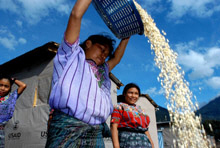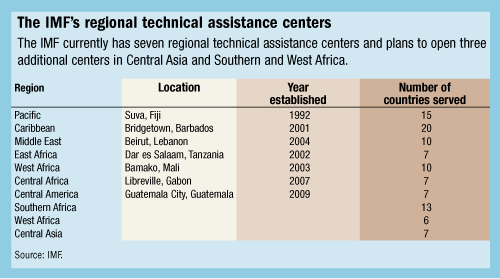
Typical street scene in Santa Ana, El Salvador. (Photo: iStock)
IMF Survey: IMF Opens Central American Technical Assistance Center
June 24, 2009
- Building skills and transferring policy knowledge in support of regional integration
- New center will allow more effective response to new challenges in global economy
- Demand for technical assistance expected to increase as countries seek closer economic links
The IMF, building on a successful model for transferring economic skills and best practices, opened a new technical assistance center in Central America on June 24, the seventh set up by the Fund around the world to train central bankers, economic officials, and others.

Mayan farmers near Panabaj, about 160 km west of Guatemala City. Guatemala will host the IMF’s seventh technical assistance center (photo: Holly Wilmeth/Sipa Press).
Technical Assistance
The IMF now serves a total of 94 countries through all the technical assistance centers and plans to open three additional centers in Central Asia, and Southern and Western Africa. “The Fund’s regional capacity building initiative was launched in 1992, and today we are inaugurating the seventh Regional Technical assistance Center here in Guatemala,” said IMF Deputy Managing Director Takatoshi Kato, who presided over the inauguration ceremony in Guatemala City.
The Central America, Panama, Dominican Republic Technical Assistance Center (CAPTAC-DR) is the Fund’s second in the Western Hemisphere after the Caribbean Regional Technical Assistance Center, which has been operating since 2001 on the island of Barbados.
Initially, the Center’s activities will focus on the key areas representing common policy challenges to member countries, including financial sector supervision and regulation; tax and customs policy and administration; medium-term expenditure frameworks and public financial management; money and public debt markets; and macroeconomic statistics. The Center will also offer training courses as well as seminars and workshops.
A successful model for building capacity
The IMF’s regional technical assistance centers are widely considered a successful model for capacity building by the international community. A key component to this success is that the technical assistance delivered through these centers is demand-driven, responding to the needs of countries, and is closely connected to their poverty-reducing strategies. The technical assistance services offered by the centers both complements and supplements the technical assistance provided by other donors.
The centers provide a natural platform for harmonization of regulatory frameworks, and adoption of best practices, as well as overall economic integration.

Why the Central American region?
The regional technical assistance center will serve Costa Rica, the Dominican Republic, El Salvador, Guatemala, Honduras, Nicaragua, and Panama. The small and similar structure of CAPTAC-DR recipient countries makes globalization an ideal route to sustain a high-level of output growth, which is needed to reduce the extreme and widespread poverty in the region. In recent times, these countries have pursued stronger trade and financial links with North American countries and the European Union (EU). The Central America free trade agreement with the United States has entered into force for all of the CAPTAC-DR countries. Four of these countries are negotiating a free trade agreement with Canada and negotiations on an Association Agreement with the EU are underway.
Regional integration provides an effective platform to pursue their other objectives. Foreign investors are more likely to invest in any individual country if doing so gives them a foothold in Central America, Panama and the Dominican Republic with its population of over 40 million. In the last two years, the pace of regional economic integration has accelerated, as demonstrated by increased cooperation among key regional bodies. The regional authorities are pressing ahead with the creation of a Central American customs union. The private sector and financial institutions, keeping pace with the public initiatives, are increasingly operating regionally, making the case for tax coordination, harmonization of laws and regulatory frameworks, and cross-border consolidated supervision of banks more urgent.
As Central American countries pursue closer economic links with each other, there will be an increased need for technical assistance and training to tackle common issues and challenges, and build productivity-enhancing institutions. This, together with the similarities between the countries’ economic structures and stages of development, argue for a coordinated regional approach to technical assistance delivery.

CAPTAC-DR donor meeting, December 11, 2008. (left to right): Shawn Ladd, Office of the IMF Executive Director for Canada, Mr. Miguel Martinez, Ministry of Finance, Spain, Mr. Luis Arturo Jimnez, Office of the IMF Executive Director for Spain, Mr. Fernando De Oloqui, Inter-American Development Bank (photo: IMF).


